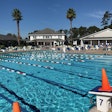Source: National Swimming Pool FoundationColorado Springs, Colorado, November 13, 2012 - The National Swimming Pool Foundation® Board of Directors is pleased to announce it has continued its commitment to fund research to study the health benefits unique to aquatic exercise. The non-profit organization has awarded three grants for year 2012-2013, totaling $67,974, with the potential to fund an additional $50,000 to extend the studies through 2014, for a total of $117,974.
"When the National Swimming Pool Foundation funds a grant, we are investing in our future, helping more people to benefit from aquatic activity. And, more people using water creates growth for service companies, retailer, builder, distributor, facilities and manufacturers," emphasizes Bill Kent, Chairman of the Foundation's Grant Review Committee. For the last several years, many National Swimming Pool Foundation grants have focused on understanding and scientifically verifying the unique benefits that water immersion, exercise and activity provide. "Physicians, therapists, and insurance companies rely on published science when considering options to treat patients. As people age, medical costs increase and mobility and quality of life decreases. We believe we have the magic potion. Our funded research will prove it," concludes Kent. The percentage of Americans older than 65 will increase from 12.4% to 19.6% by 2030 according to the U.S. Census data; similar trends are occurring around the world.
A grant of $25,000 was awarded for the first year of a two-year program to Hirofumi Tanaka, Ph.D., Associate Professor and Director of the Cardiovascular Aging Research Laboratory at the University of Texas at Austin. The study will investigate the effects of regular swimming exercise on cardiovascular functions in middle-aged and older adults with osteoarthritis. Researchers will explore how aquatic activity can benefit nearly 27 million Americans who suffer from osteoarthritis, the leading cause of disability in older adults. The American College of Rheumatology has recommended that aerobic exercises be included as part of the treatment for osteoarthritis. However, arthritic joint pain is a significant barrier for adults attempting to perform land-basedactivity. In contrast, the research may prove aquatic activity is ideal for these people. A total of 40 osteoarthritis subjects will be assigned to one of the 12-week exercise interventions (swim training or cycling training).
A one year grant of $17,974 was awarded to Joel Stager, Ph.D., Professor and Associate Chair, Department of Kinesiology, at Indiana University and Director of Counsilman Center for the Science of Swimming to study long-term aquatic conditioning on aging-related cognitive, neuromuscular and cardiovascular functional decline. Research indicates that regular physical exercise is associated with enhanced cognitive ability and improved nerve and heart health in the elderly. People who have been involved in regular aquatic exercise training (workout and lap swimmers) over ten years will be compared with age-and education-matched sedentary controls. The study will include people who have engaged in intensive interval activity, some recreational activity, with sedentary people.
A third grant of $25,000 was awarded for the first year of a two-year program to Paul D. Chantler, Ph.D., Assistant Professor in the School of Medicine, Division of Exercise Physiology at West Virginia University to study the effects of aquatic exercise on arterial stiffness in Metabolic Syndrome (MetS) patients. People with MetS have a 3-fold greater risk of developing cardiovascular disease and stroke. According to the American Heart Association, Metabolic Syndrome affects about 35% of adults. The underlying causes of MetS are obesity, physical inactivity and genetic factors. Preliminary results from Dr. Chantler's lab shows that 8 weeks of land aerobic exercise begins to improve patients with MetS. The effects of aquatic based exercise training on arterial stiffness are unknown. The research will study arterial stiffness and cardiovascular function in MetS patients who perform aquatic activity.
"We will all get older. We will all die. Why not explore to what extent water activity will help us maintain our mobility and minds while we are alive," summarizes Thomas M. Lachocki, Ph.D. and CEO with the National Swimming Pool Foundation. "It is no coincidence that people believed in the 'fountain of youth' and not a 'football field of youth."Both Drs. Tanaka and Chantler presented recent findings at the October 2012 World Aquatic HealthTM Conference. Their seminars and many others associated with the benefits of water activity can be viewed at http://www.nspf.netro.ca/Products.aspxAbout NSPF® The National Swimming Pool Foundation (NSPF) is a non-profit organization founded in 1965, giving back over $4 million since 2003 to fund research grants to prevent illness, injury, and drowning, and to demonstrate the health benefits of aquatic activity. The Foundation works towards its mission to enhance healthy living by increasing aquatic activity through aquatic education and research with its collection of educational products and training. Proceeds from our leading training programs are reinvested to fund scholarships, fellowships and grants. To learn more, go to www.nspf.org.
































